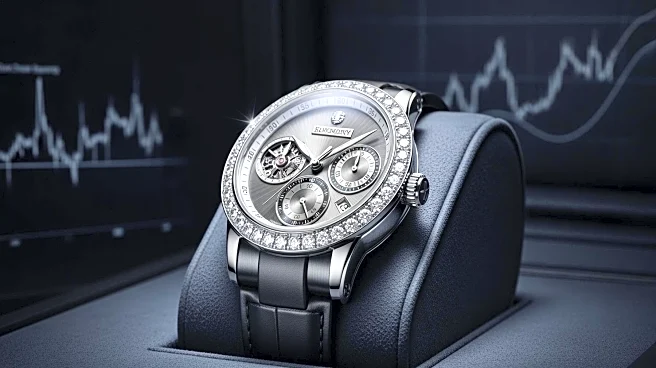What's Happening?
The luxury industry is currently navigating a challenging economic landscape, marked by a two-year decline in revenue and profit for many fashion houses. Recent developments, however, suggest potential
recovery. LVMH, a key player in the industry, reported a smaller-than-expected decline in its fashion and leather goods business for the third quarter, with overall revenue rising by 1 percent. This has sparked cautious optimism as other major luxury brands prepare to release their earnings. Kering, for instance, is set to report its third-quarter results, with analysts predicting a 10 percent revenue decline, primarily due to Gucci's ongoing struggles. Meanwhile, Hermès is expected to report a 10 percent sales increase. The economic situation in China, a significant market for luxury goods, remains a concern, with high unemployment and a sluggish real estate market affecting consumer spending.
Why It's Important?
The luxury sector's performance is a bellwether for broader economic trends, particularly in consumer spending. The industry's recovery or continued decline could have significant implications for global markets, especially given its reliance on aspirational consumers who are sensitive to economic fluctuations. A sustained downturn could lead to strategic shifts within companies, affecting employment and investment in the sector. Additionally, the performance of luxury brands in China is crucial, as it represents a substantial portion of their market. The industry's ability to adapt to changing consumer behaviors and economic conditions will be critical in determining its future trajectory.
What's Next?
As the holiday shopping season approaches, luxury brands are under pressure to perform well to offset earlier losses. Analysts will closely monitor upcoming earnings reports from Kering, Hermès, and other major players like Prada and Zegna. The industry's response to China's economic challenges will also be pivotal. Companies may need to adjust their strategies to cater to the evolving demands of both wealthy and aspirational consumers. The results of these earnings reports will likely influence investor confidence and could lead to further stock market volatility in the luxury sector.
Beyond the Headlines
The luxury industry's current challenges highlight a broader shift in consumer behavior, where aspirational consumers are becoming more price-sensitive. This shift could lead to a reevaluation of pricing strategies and product offerings. Additionally, the industry's reliance on China underscores the interconnectedness of global markets and the potential risks associated with economic slowdowns in key regions. The divergence between wealthy and aspirational consumers may also prompt luxury brands to innovate and diversify their product lines to maintain market share.










